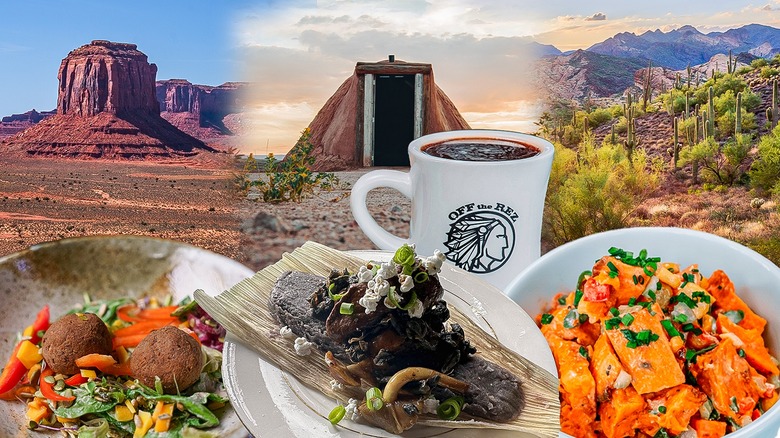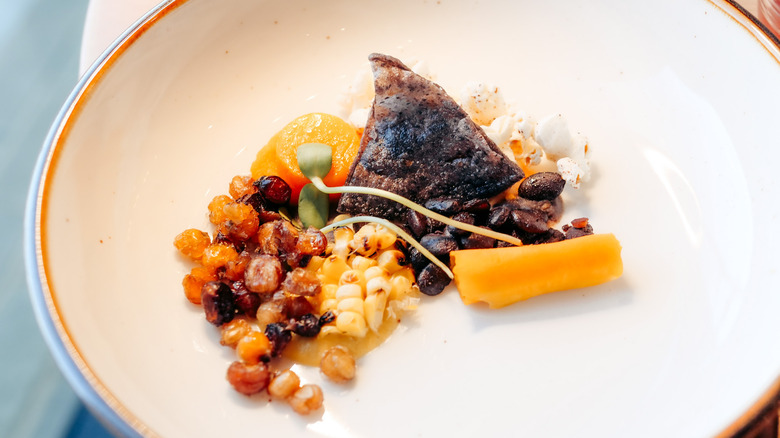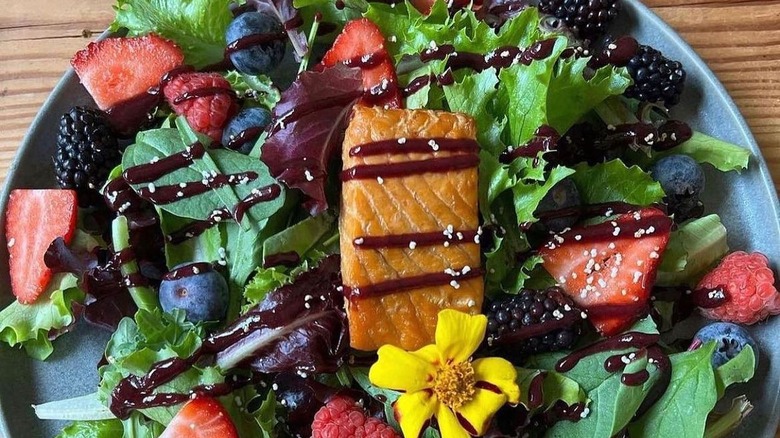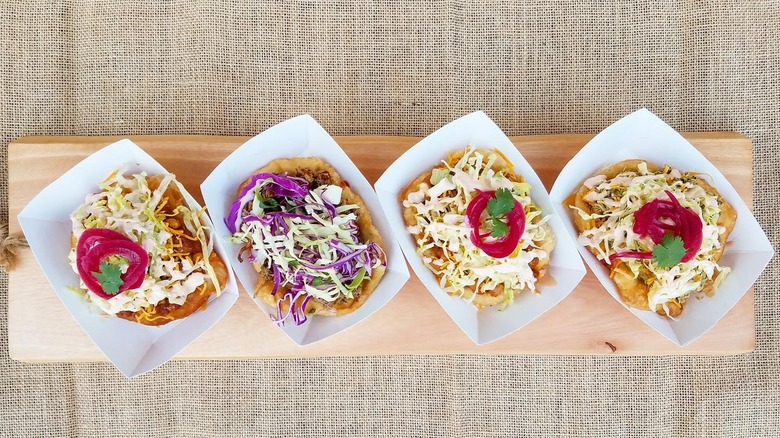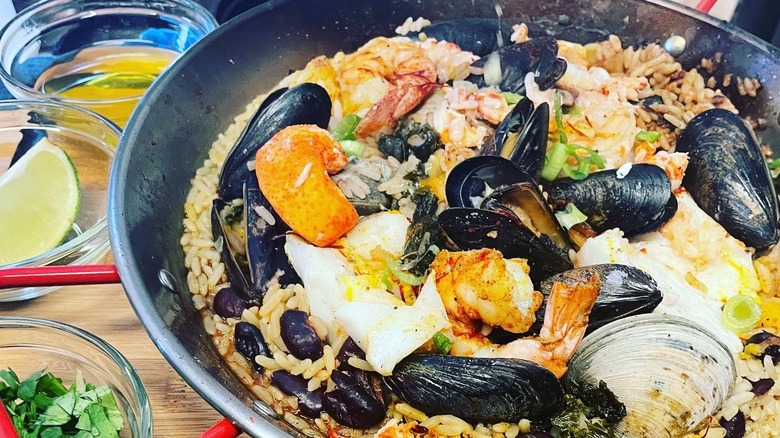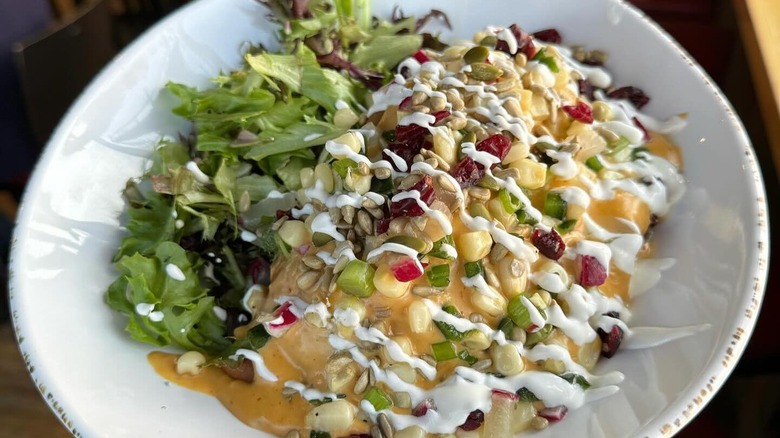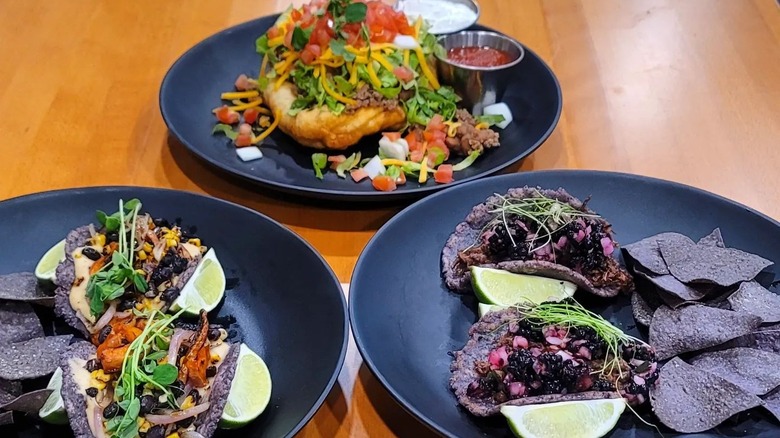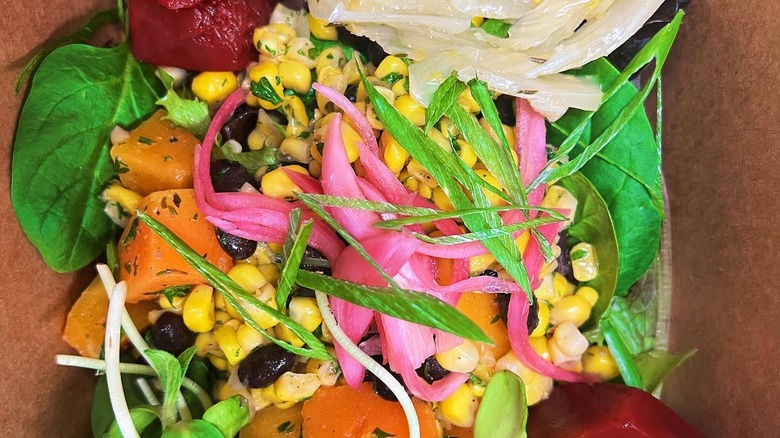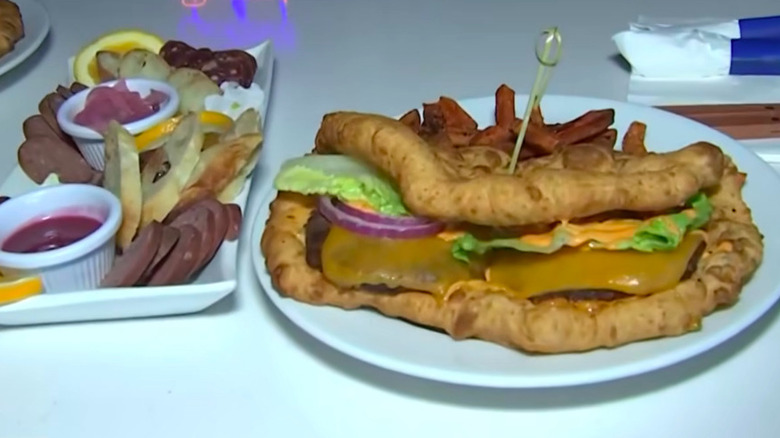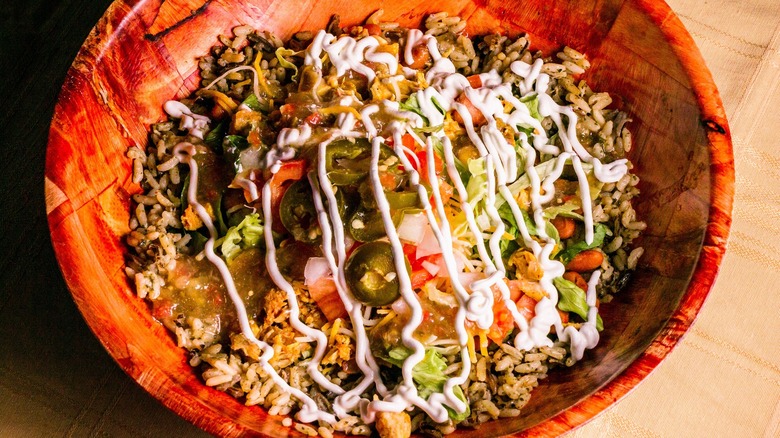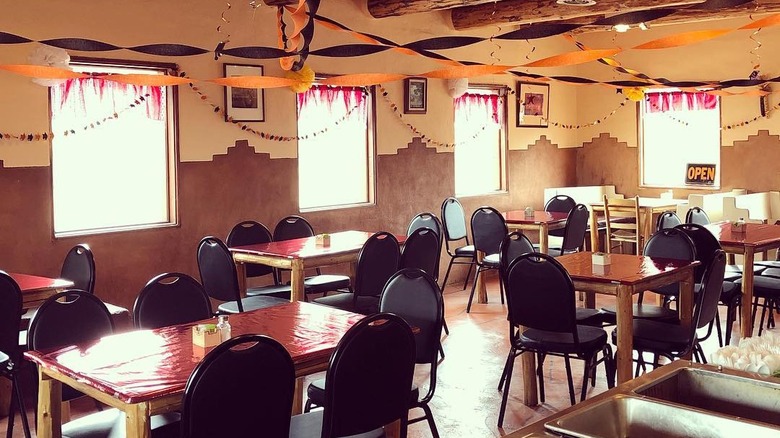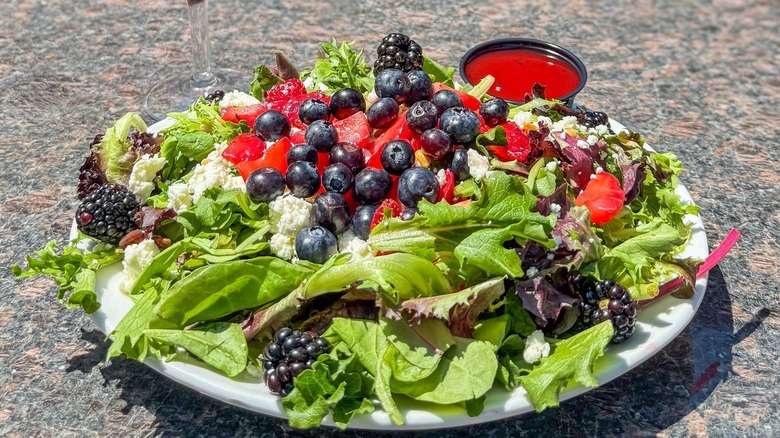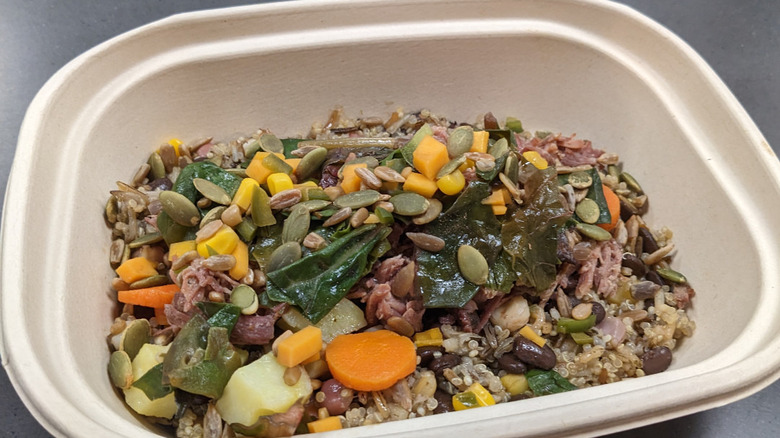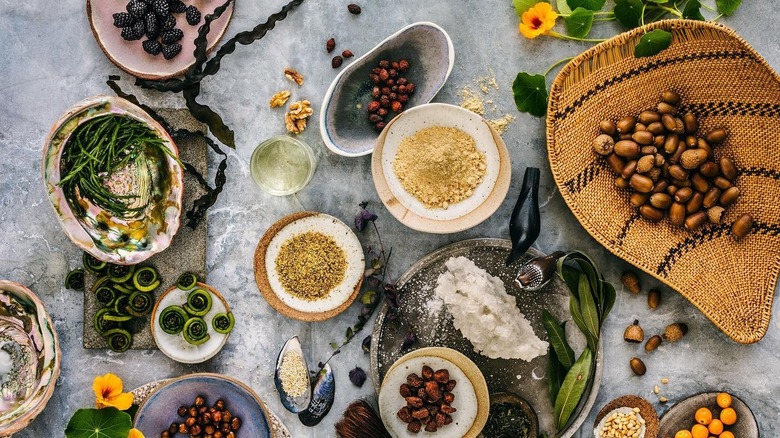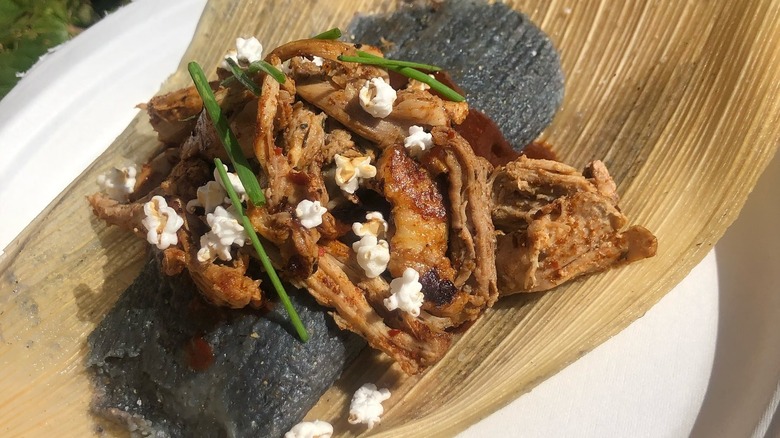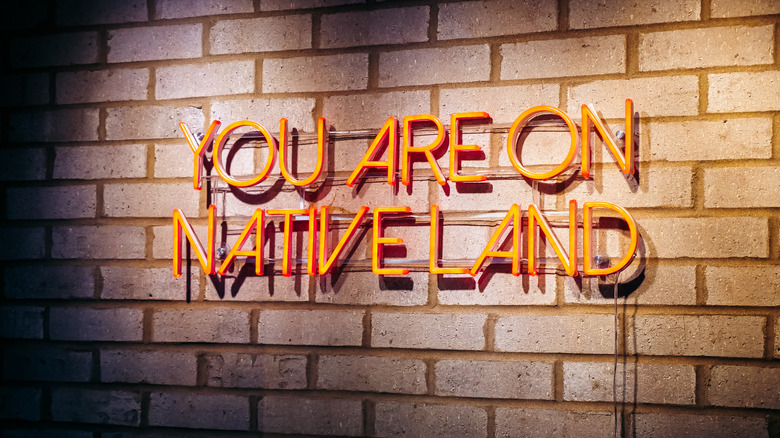14 Restaurants Across The US To Try For Native American Heritage Month
Since the 1990 establishment of November as Native American Heritage Month in the U.S., recognition of Indigenous culture is growing. Amid this renaissance, Indigenous communities are reconnecting to culinary traditions and ingredients that originated in North America. Some are well-recognized foods like corn, berries, squashes, and wild rice, while others are less familiar.
Fry bread might be among the first foods that come to mind when you think of Native American cuisine. Despite its popularity, this food has a complex history. Fry bread's origins as a Navajo staple are thought to date back to the mid-19th century. During the 1860s, a series of forced displacements of the Navajo (Diné) — known as The Long Walk — resulted in the Native people arriving in barren landscapes of the Southwest, where they were unable to produce traditional foods like beans and vegetables. Instead, they were given a few basic ingredients to survive, including flour, sugar, and lard, which were used to make fry bread.
For generations, incidents like The Long Walk caused Indigenous communities to be continually isolated, and subsequently, they became disconnected from traditional food systems. In a gradual movement to reconnect with their roots, Native chefs across the country are crafting imaginative dishes that draw on wild ingredients, nostalgic memories, and modern interpretations of historic foods. Explore this culinary revolution at restaurants, cafés, pop-ups, and other venues found around the U.S., where you can taste Indigenous history, tradition, and connections to the land while sampling diverse Native American foods, ranging from banahas to hominy stew.
Owamni
A neon sign reading "You are on Native land" greets guests when entering Owamni, the restaurant operated by Oglala Lakota Sioux chef Sean Sherman, which overlooks the Owámniyomni waterfalls in Minneapolis. Sherman has been making waves in the Native food movement long before he opened Owamni in 2021. At Owamni, food is education. Central to this endeavor is Sherman's commitment to using pre-colonial ingredients. Wheat flour, dairy products, and cane sugar do not appear in dishes here. Native grains and sweeteners like maple syrup are used instead.
The menu changes with each season, reflecting the traditional eating patterns of Indigenous communities with livelihoods deeply tied to nature. The fall menu features dishes like turkey tacos topped with cranberries, tomato-walnut soup, and smoked rack of elk served over pumpkin-carrot puree. While Americans might be more accustomed to eating meats like beef, chicken, and pork, game meats like elk and bison were common proteins among Indigenous communities, and they are commonly served at Native restaurants like Owamni. Dining here is an excellent opportunity to learn everything you need to know about elk meat, and why you may want to make it a more common part of your diet.
Each detail at Owamni is impeccably executed, down to the drink menu. Teas and non-alcoholic cocktails blend Native shrubs and herbs, including rose hip, fireweed, and dandelion root. The restaurant also features a wine list highlighting offerings produced by Native vintners.
(612) 444-1846
420 S 1st St, Minneapolis, MN 55401
Wahpepah's Kitchen
Amid ancestral Ohlone land, Wahpepah's Kitchen was created in Oakland, California as a space to uplift Indigenous knowledge and tradition through food. Owner and head chef Crystal Wahpepah draws from multiple Indigenous backgrounds — she is a member of the Kickapoo nation of Oklahoma, but spent her youth in Oakland as part of a diverse Native community. Wahpepah also gives educational talks as an advocate for Indigenous people.
The menu of Wahpepah's Kitchen — which is available in both English and the Kickapoo language — changes with the seasons. Every detail of the restaurant reflects Wahpepah's goal to "use Indigenous knowledge and expertise to transform food systems so they honor the origins, land, and Indigenous connection to each ingredient," as noted on the eatery's website.
Dig into comfort foods like bison chili with fry bread or the Three Sisters Veggie Bowl, which features the traditional Indigenous-cuisine trio of corn, beans, and squash. Wahpepah's Kitchen also serves more nuanced dishes like sweet potato hibiscus taquitos topped with blueberry pico de gallo, as well as salmon tostadas garnished with toppings like watermelon radish and maple chili oil. Save room for something sweet at the end, like a pumpkin-squash polenta topped with berries.
(510) 698-4067
3301 E 12th St #133, Oakland, CA 94601
Off the Rez
In Seattle, a Pacific Northwestern city built on ancestral Duwamish land, Indigenous history and heritage run deep. Off the Rez is a groundbreaking Native-owned café and food truck based in the Emerald City. Head to the Burke Museum by Seattle's University District to enjoy the casual but tasty menu at Off the Rez.
For breakfast, sample different variations of fry bread. The deep-fried bread can be ordered plain, topped with lemon curd, dipped in cinnamon and sugar, or drizzled with honey, among other options. A perfect complement to the fry bread at Off the Rez is the café's homemade cedar and blackberry tea.
During lunch, try a wild rice bowl or a taco made with fry bread in place of a tortilla. Either dish can be topped with bison, chicken, BBQ pork, or veggies. The café's food truck can also be found at various locations across Seattle. The company's mission goes deeper than food, serving as a meeting space for the Native community, while participating in cultural events and boosting Indigenous organizations.
(206) 414-8226
4303 Memorial Way NE, Seattle, WA 98195
Sly Fox Den Too
In 2023, Mashpee Wampanoag chef Sherry Pocknett earned a James Beard Award, and she is widely lauded as the first Indigenous woman to earn this acclaim. Her restaurant, Sly Fox Den Too, is located within a humble building in Charlestown, Rhode Island, amid the ancestral territory of the Narragansett community.
The menu features a diverse selection of breakfast, lunch, and dinner dishes inspired by regional Indigenous ingredients. Start your morning here with the Sly Fox Benedict, featuring poached eggs on corn cakes with venison sausage and hollandaise sauce. During lunch and dinner hours, soups, salads, and sandwiches are all on offer. For seafood specialties, try the crab cakes, smoked scallops, or steamed Atlantic mussels served in a garlic sauce. Additionally, the Quahog Chowdah is a must-try, blending clams, potatoes, and onions in a creamy broth.
An expanded version of this restaurant is in the works. The Sly Fox Den restaurant and cultural center is slated to educate visitors about Native foods and culture. For now, the Sly Fox Den Too is open Thursday through Sunday, with dinner served between 5 p.m. and 9 p.m. on Fridays and Saturdays.
(401) 642-7350
4349 S County Trail, Charlestown, RI 02813
Tocabe
Since its grand opening in 2008, Tocabe has earned a place of pride as the Denver area's leading restaurant that is Indigenous owned and operated. Tocabe serves dishes inspired by Osage recipes passed down between generations.
Indigenous, fresh, and local products are central to this establishment, which specializes in dishes like tacos, bison ribs, and stuffed fry bread. If you're interested in cooking Indigenous-inspired recipes at home, check out Tocabe's online marketplace stocked with Native-sourced ingredients like cornmeal, wild rice, and syrups. Pair these products with a traditional fry bread recipe for a homemade feast! Tocabe also offers catering services for a wide range of events.
Support for Native communities is central to Tocabe, down to the very careful sourcing of ingredients used on the menu. Tocabe even provides a breakdown of where ingredients have been obtained, and which Indigenous farms and suppliers are being supported.
(720) 524-8282
3536 W 44th Ave, Denver, CO 80211
Nātv
Serving Indigenous fare inspired by local Oklahoma ingredients, Nātv only opened its doors in the spring of 2022. However, the concept has been a longtime aspiration of Jacque Siegfried, a Shawnee chef who first dreamt of launching a Native American restaurant when she was a young child.
This relaxed eatery in Broken Arrow, Oklahoma — located about a 20-minute drive outside of Tulsa — serves modern interpretations of Indigenous dishes. Offerings at Nātv are crafted with regional ingredients provided by local farms and Indigenous communities. Native foods like pumpkin, corn, beans, and bison are commonly featured on the menu, which includes dishes like fry bread, blue corn tacos, and wild rice bowls.
Nātv also strives to dig a bit deeper beyond the crowd favorites with its Native dishes, and centers inventive, modern takes on traditional flavors through more unusual specialties. Pork belly succotash, bison sliders, and seared trout are all winners for meat eaters. Meanwhile, vegetarians are spoiled for choice with options like artichoke gnocchi or smoked pumpkin salad.
(918) 940-7296
1611 S Main St, Broken Arrow, OK 74012
Katahdin Kitchen
Katahdin Kitchen has brought a taste of contemporary Indigenous cuisine to Maine. This newly launched business honors its home amid ancestral Wabanaki land, and draws inspiration from regional ingredients and Native culinary traditions.
Regionally sourced seafood and meats are crafted into delightful dishes like crab cakes, sumac and molasses barbecue salmon, and venison smash burgers. Local farms serve as the inspiration for veggie-forward delights like street corn sprinkled with sage and microgreens, roasted root vegetable salad with strawberries and goat cheese, a quinoa and squash bowl topped with sunflower seeds and blueberry reduction, and the Sisters Salad of squash, corn, beans, and beets over greens.
Katahdin Kitchen's focused and creative menu changes about every six weeks, or when new seasonal inspiration strikes. The kitchen is currently open on Thursday afternoons, serving from 2 p.m. until 7 p.m. or when the food runs out.
instagram.com/katahdin_kitchen
(207) 356-2043
1492 State St, Veazie, ME 04401
The Frybread Lounge
The Frybread Lounge is a fresh addition to the Indigenous culinary scene in Arizona. The Old Town Scottsdale restaurant just opened for business in summer of 2024.
Chef Darryl Montana, a member of the O'odham community who worked side-by-side with Owamni's Sean Sherman, heads the new restaurant that offers a modern menu inspired by local Indigenous traditions. Frybread Lounge procures its ingredients from local and national Indigenous sources to support the Native community in every capacity possible.
It should come as no surprise that fry bread is featured on the menu, which can be enjoyed as part of a taco or sandwich, or alongside a bowl of chili. Once you've had your fry bread fix, go beyond the restaurant's namesake dish and sample other specialties like hickory-smoked bison ribeye, mesquite maple tepary beans, or the charcuterie board featuring Indigenous meats with pickled onions and jams.
(480) 881-8245
7211 E Main St, Scottsdale, AZ 85251
Indigenous Eats
With two locations around Spokane, Washington, Indigenous Eats is a casual restaurant combining modern style and historic ingredients. The eatery serves contemporary food "inspired by the rich culture and traditions of Indigenous communities," as noted on the Indigenous Eats website.
Comfort food takes center stage at Indigenous Eats. The menu focuses on soups, sandwiches, and tacos. For a light meal, try a bowl of the Three Sisters Soup. For something heartier, go for the tacos. Tacos come with a choice of ground beef, veggies, chicken, and the more adventurous ground bison option, which is topped with beans, cheese, lettuce, tomato, pickled jalapeños, and tomatillo salsa.
Indigenous Eats serves a burger made with a Native twist, as it's served on fry bread buns and slathered with huckleberry relish. If you want to fully embrace the huckleberry, Indigenous Eats also makes a dessert of fry bread topped with powdered sugar and served with huckleberry sauce — a perfect finale to your meal.
Multiple locations
Tiwa Kitchen
Taos Pueblo is known for its historic adobe buildings, art galleries, and the nearby Sangre de Cristo Mountains. This site is also rich in Indigenous history, having been continuously inhabited by Native people for over 1,000 years. Visitors exploring this desert town in northern New Mexico can stop by Tiwa Kitchen for a taste of the region's Indigenous heritage.
Tiwa Kitchen serves homemade dishes that blend Indigenous and New Mexican influences, like the blue corn taco served with homemade red or green chili, or the fry bread buffalo burgers. The Tiwa Taco is another classic — In this household special, cheese, lettuce, tomatoes, beans, and ground beef are served on top of fry bread.
Tiwa Kitchen doubles as a bakery. If you can't stay for a meal, take home baked goods like traditional Pueblo cookies, piñon prune apple pie, or blueberry turnovers. Tiwa also sells fry bread mix, a meat rub seasoning blend, and wild plum jam.
(575) 751-1020
328 Veterans Hwy, Taos, NM 87571
Indian Pueblo Kitchen
The Indian Pueblo Cultural Center in Albuquerque is a hub that preserves and extends the experiences of the Pueblos of New Mexico to the public, including Indigenous foods. Come and sample the flavors of New Mexico's Native communities at the facility's Indian Pueblo Kitchen.
Historic Pueblo traditions have inspired the restaurant's menu, which features local staples and seasonal produce. Breakfast is served all day and blends Pueblo flavors with well-known breakfast dishes, including the Native superfoods waffles crafted from blue corn, quinoa, currants, piñon, sunflower seeds, pumpkin seeds, and berries.
Indian Pueblo Kitchen also serves salads, sandwiches, and hearty main courses. Among its most popular dishes are the house-made stews, ranging from bison cabbage stew to elk chili. The blue corn enchiladas — filled with cheese, onions, and corn, and served with squash and Pueblo beans — are another favorite. Seasonal salads with tasty toppings like candied pumpkin seeds and berries provide a fresh balance to more filling dishes.
(505) 724-3510
2401 12th St NW, Albuquerque, NM 87104
Indigenous Food Lab
As another establishment serving Native food that was conceptualized by Sean Sherman of Owamni, the Indigenous Food Lab in the Midtown Global Market of Minneapolis serves grab-and-go meals and made-to-order dishes. The eatery aims to address the health and economic crises facing Native communities through the active fostering of traditional Indigenous food systems.
During 11 a.m. to 5 p.m. from Tuesday through Saturday, the Indigenous Food Lab offers four main options: tacos, masa pocket sandwiches, grain bowls, and salads. Choose between toppings like birria-style bison, mushrooms, and smoked lake trout. Put a finishing touch on your meal with homemade salsas, including corn salsa and salsa verde.
The Indigenous Food Lab doubles as a market selling products that support Native businesses, like hot sauces, syrups, and organic beans. This is more than just a place to grab a Native-inspired lunch. It serves as a pivotal center for education within the local Indigenous community.
natifs.org/indigenous-food-lab
(612) 208-0625
920 E Lake St #107, Minneapolis, MN 55407
Cafe Ohlone
Situated beside Berkeley's Hearst Museum of Anthropology, Cafe Ohlone is a poetic ode to the people whose ancestral land is where cities in California's Bay Area are built. The cafe opened in 2018, and is an extension of the mak-'amham project, a cultural establishment formed in 2017 to serve as a central pillar of California's Ohlone community, providing programs ranging from cooking courses to language classes.
Cafe Ohlone celebrates and preserves the history and culture of the Ohlone people through each detail, from the thoughtfully designed space to the native plant garden to the carefully curated tea and food menu. Cafe Ohlone welcomes the public for meals, as well as for private events and educational workshops. The cuisine is as delicious as it is edifying. Sample seasonably available foods such as black oak acorn soup, chanterelle mushrooms, Dungeness crab, and teas made from yerba buena, elderberry, and hummingbird sage. According to management, Cafe Ohlone is currently not operating with regular hours, but will reopen in spring of 2025.
Javelina
Javelina is a passion project of Alexa Numkena-Anderson, a professionally trained chef who was born and raised on the Yakama Reservation in Toppenish, Washington. Launched in the fall of 2023, this catering and pop-up culinary business brings the food of Numkena-Anderson's mixed Native American upbringing to the region of Portland, Oregon. While her roots stretch back to the Yakama, Cree, and Skokomish nations, Numkena-Anderson's grandfather is from Arizona's Hopi nation.
Through her food, Numkena-Anderson strives "to help her community eat better and educate guests about what North American cuisine should be," as noted on the Javelina website. Food is both the story and the medicine at Javelina. Wild game meat, local fish, and regional herbs, berries, and root vegetables all take center stage on the menu.
Creative offerings that highlight Indigenous ingredients include bison ribeye skewers with lion's mane mushrooms, sockeye salmon steamed in corn husks, and blue corn cakes topped with local berries. Javelina draws influences from comfort foods that Numkena-Anderson grew up cooking with her grandmother. She blends these memories with Pacific Northwestern traditions and influences from her Southwestern roots. Although Javelina doesn't yet have a permanent location, Numkena-Anderson regularly hosts pop-up events, and caters by request.
Methodology
The process of selecting these restaurants was multifaceted. As I frequently write about food through the lens of history and culture, I have been exploring the Indigenous food scene in the United States for many years. When presented with the opportunity, I visit Native restaurants, as I think it's a crucial component in understanding both the culinary history and future of the country — not to mention that it makes for an interesting experience. I have personally eaten at Owamni, Off the Rez, and Indigenous Food Lab.
The other restaurants were found through research and by reaching out to contacts in food and travel endeavors who work with Indigenous chefs and restaurants. When selecting the restaurants and pop-ups, I included places that tell a story. They focus on original dishes that reflect Native culinary traditions both past and present, and incorporate local ingredients. Other things I looked for were restaurants that support other Native businesses and the broader Indigenous community, while making sure all regions of the United States are represented.
